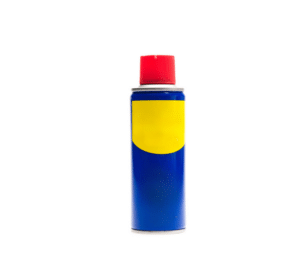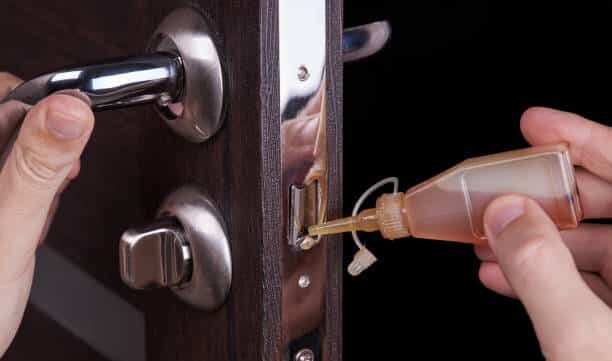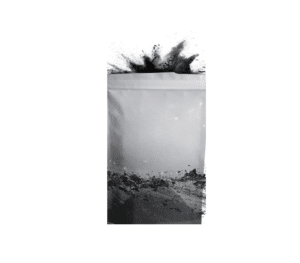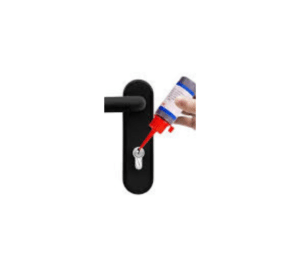Locks play a crucial role in our everyday lives, ensuring the security and protection of our belongings. However, over time, locks can become stiff and difficult to operate. This is where lock lubricant comes to the rescue.
A lock lubricant is a specially formulated substance designed to reduce friction and promote smooth operation within a lock. It typically comes in the form of a spray, oil, or graphite powder. Each type of lubricant has its unique properties and is suited for different types of locks. Let’s explore the benefits of each type in more detail.
In this comprehensive guide, we will explore the following;
- The Importance Of Lock Lubricant
- Benefits Of Using Lock Lubricant
- Different Types Of Lock Lubricant
- Choosing The Right Lock Lubricant
- Step-by-Step Guide To Lubricating A Lock
- Common Mistakes To Avoid
- Role Of Professional Locksmith
- Where To Buy Lock Lubricant
Importance of Lock Lubricant
Lock lubricant is important to keep the locks functioning and last longer. As time goes by, dirt can accumulate in the lock mechanism causing it to get stiff and difficult to turn open. This may result in loss of time, frustration, and damage to the lock itself. By applying lock lubricant regularly you can mitigate these problems before they arise, thereby ensuring smooth operation of your locks.
Lock lubricant reduces friction within a lock while also acting as moisture and rust repellent. This is particularly crucial for outside locks that are exposed to weather conditions. In this case, the surface becomes slippery making it difficult for dirt or other materials to accumulate and making it hard for any intruder to tamper with the lock.
Benefits of Using Lock Lubricant
The use of lock lubricants has multiple benefits, especially in residential as well as commercial locking systems. First, it makes the entire process of using a keyless complicated by reducing friction between different parts that move. The outcome is more effortless unlocking and locking.
Another great thing about having lock lubricants is that they help prevent breakages and accidental entrapments when keys are stuck inside a door. A key can be broken into two pieces because pressuring an un-turning device stresses its blade beyond its breaking point thus inducing fractures onto its body which may not only be costly but also inconveniencing if one had an emergency at hand; however, avoiding such issues simply calls for regular application of lubrication on any entrance’s pinhole.
Additionally, the use of such products creates a barrier between water/moisture and metals preventing oxidation that leads to malfunctions hence safeguarding our security systems from intruders who rely on forceful entry through damaged cylinders due to wetness caused by bad weather patterns like long rains or floods.
Different types of Lock Lubricant
There are many types available: choose one based on what suits you best.
Graphite Powder
Graphite powder is the most common lubricant for locks. It is a dry lube that works well on delicate mechanisms like pin tumbler locks. Graphite powder provides long-lasting lubrication and can be used in extreme temperatures.

Spray Lubricant
The aerosol can is the best way to apply this type of lubricant because it has a narrow tip that fits inside tight spaces within your lock mechanism. As a rule, spray lubricants contain a combination of cleaning solvents and other materials making them perfect for both cleaning and oiling at once.
Oil-Based Lubricant
When it comes to locks used in homes, they tend to have oil-based lubricants applied to them. These oils come from various viscosities such as thin ones or thicker greases. Locks exposed to extreme weather conditions function better after being given oil-based lubrication.
When deciding which lock lubricant to buy consider the type of lock you are using, where it is being used, and what the manufacturer recommends. To get professional advice consult with a locksmith.
Choosing the Right Lock Lubricant
The right choice of lock lubricant will ensure optimum performance and protection for your locks.
Here are some things to consider when making your selection:
- Lock Type: Lubrication requirements differ from lock to lock. A pin tumbler lock, for instance, might need graphite powder, while particular oil-based lubricants are better for some types of residential locks. Always follow the lock manufacturer’s guidelines or ask a locksmith to recommend the best type of lubricant when in doubt.
- Environmental Conditions: Consider where your lock is situated. If your lock experiences extreme temperatures or high levels of humidity, go for a lubricant that has protection against these conditions. Moisture-repelling and rust-prevention properties are important features to look out for in outdoor locks.
- Ease of Application: Some lubricants are easier to use than others. You may prefer aerosol lubricants with a nozzle which you can direct at the specific parts if you have the skill as an amateur handyman. However, if you are not sure about it then, it would be prudent enough to seek help from professional locksmiths who can apply it on your behalf.
Remember that choosing the right kind of lock lubricant is vital when it comes to maximum performance and protection. In case of any confusion, it is wise to consult experts since they will guide you accordingly.
Step-by-Step Guide to Lubricating a Lock
Now that we know why one needs a good quality lock lubricant and how to select one let us look at how this can be done step by step towards applying it to your lock. These simple steps should keep your locks operating smoothly and efficiently:
- Gather Your Supplies: Before starting, ensure you have all the materials needed such as; Lock Lubricant, clean cloth/paper towel, And small brush/cotton swab – precision application
- Clean the Lock: Start by thoroughly cleaning the entire length of the keyway off dirt particles or debris and old lube residue using a piece of clean cloth or paper towel; get into grooves using miniature brushes or cotton swabs in cases where there is stubborn dirt, which is hard to reach.
- Apply the Lubricant: The lock should be properly lubricated by applying a little of it on the key before you insert it in. Shake the lubricant all over as you twist it back and forth severally for even distribution. Avoid putting too much oil as this will make your lock attract dust particles.
- Wipe Away Excess Lubricant: After that, wipe off any extra creamy material with a clean piece of cloth or paper towel so that it does not fall on surfaces or attract dirt.
- Test the Lock: Finally, test your lock for smooth operation. A few insertions and removals of the key will indicate whether or not there is stiffness when opening and closing. Where necessary, apply some more lubricants and repeat until the lock operates smoothly without any hindrance.
By doing these things simply, you can maintain locks’ performance and longevity so that they serve their purpose effectively.
Common Mistakes to Avoid When Lubricating a Lock
While lubricating a lock may seem simple enough, many people still make common mistakes in doing this. Making sure you avoid these pitfalls would help ensure that the process of lubrication works well for you.
- Using the Wrong Lubricant: The wrong kind of oiling agent could be worse than none at all. It is always best to follow the manufacturer’s guidelines concerning locks or ask an expert to recommend a suitable type of grease for your door’s fastening system in case you are unsure about its specifics.
- Lubricating Locks too much: Over-lubricating a lock will attract dirt and dust that can cause jamming of the lock. Therefore, applying a small amount of oil is recommended to solve the problem.
- Failure to Clean the Lock: It is not advisable to lubricate a dirty lock. For better performance, you should always take time to clean up your locks before applying any oil on them.
- Not Testing the Lock: The oiling process must always be concluded by testing its functionality. Thus it helps you determine whether your system could be having some issues that may need some adjustments.
Being aware of these common mistakes guarantees an effective and beneficial process in the future for lubricating locks.
Role of Professional Locksmith in Lubrication
While one can lubricate their locks, there are instances where professional locksmithing skills are indispensable. Various issues concerning door locks including lubrication require technical know-how from professional locksmithists who have been highly trained over the years.
A locksmith can assess the condition of your locks, recommend the appropriate lubricant, and apply it with precision. Moreover, they can identify other problems that may affect performance and find solutions to them. To become more confident about safety either at home or at the workplace you can entrust their care into the hands of experts in this field.
Where To Buy Lock Lubricant
Lock oils are available nationwide from various sellers as follows;
Hardware Stores
Local hardware stores often stock a range of different types of lock grease. Visit any nearby hardware store and ask for guidance on what type they have got.
Locksmiths
A wide choice range exists this is because they always have stocks ranging from greases to other related items used in lubricating all kinds of these devices. Talk with such professionals so that you get guidelines on how to select one among those important things for use during maintenance purposes
Online Retailers
Amazon is just one example of many such online retail stores where you can get a wide variety of brands that can serve the purpose. Go through them and see what other users are saying about them before buying.
Ensure you choose a good brand for the lock grease and always read through the company’s specifications to know if it meets your needs before purchasing.
Conclusion
Lock lubricant is a vital tool in maintaining the functionality and longevity of your locks. By regularly applying lock lubricant, you can prevent lockouts, key breakages, and potential security risks. Remember to choose the right lubricant for your specific lock type and environmental conditions, and follow the step-by-step guide to ensure effective lubrication. Should you require professional assistance, do not hesitate to consult with a locksmith. By investing a little time and effort into lock lubrication, you can ensure that your locks continue to serve their purpose of keeping your belongings safe and secure.
Frequently Asked Questions
1. Can I use WD-40 as a lock lubricant?
WD-40 may indeed be utilized to lubricate locks temporarily, but in the long run, it is not advisable for use since it lacks considerable properties of authentic lock grease. It performs rust busting and water displacing functions because it is specifically formulated for quick penetrative ability into stuck objects.
2. How often should I lubricate my locks?
The frequency of lubrication for locks is influenced by various factors such as the kind of lock, environmental conditions, and usage. It is advisable to oil your locks at least once a year as an overall rule of thumb. Nonetheless, if you notice that it’s stiff or hard to operate them through the key then apply some lubricant on them.
3. Can I use any type of oil as a lock lubricant?
It is not recommended to use just any type of oil as a lock lubricant. Some oils can attract dirt and debris which will cause malfunctions in the lock. To ensure optimum performance and protection it’s best to use a lubricant that’s specifically formulated for locks.
4. Can I use lock lubricant on car locks?
Lock lubricants can be used on car locks but it is important to go for a suitable one formulated for automotive application. Different environmental conditions such as extreme temperatures and road debris affect car locks. Seek advice from an expert locksmith or follow manufacturer guidelines regarding suitable lock lubes for your cars.
5. Can lock lubricant fix a broken lock?
Reducing friction and preventing rust are two ways in which applying lock lube may improve how well the door operates. Lubricating alone cannot mend broken or damaged locks; therefore, consult with professional locksmiths whenever faced with such situations who will assess the situation on behalf of the client, and recommend repairs or replacements where necessary.
6. Can I apply lock lubricant to electronic locks?
Normally, electronic locks have their maintenance procedures hence not always needing traditional types of lubricants meant for general padlocks. Inquiring from the manufacturers’ guides will give one more insight into taking care of an electronically locked door since different sets have unique specifications.
7. Is it safe to use Lock Lube around kids and pets?
After drying up properly, it is generally safe to let children play around since Lock Lube does not jeopardize their health. However, it is always advisable to keep children and pets away from these areas during lubrication to avoid accidental ingestion or contact.
8. Can I use lock lubricant on frozen locks?
By preventing rust and reducing friction, applying lock lube can make the key go in easily. But if your door’s lock is seriously frozen, then you should get an experienced locksmith who will safely thaw it and determine if there are any underlying issues or not.
9. How long does lock lubricant last?
The duration of a lubricant for locks depends on several factors like which type of lube is used, weather conditions, and usage. In general, one can use a single lock lube for several months to one year before replacing it. After that, inspect your locks regularly so that you may apply more oil as necessary.
10. Can lock lubricant damage my locks?
When followed correctly, lock lube will not spoil your locks at all. Over-lubricating should be avoided as too much oil attracts dust among other dirt particles. Similarly, misusing the wrong type of lubricant might result in mechanical hitches thus use the technician’s advice or consult professional locksmiths to make sure that correct lock lubes are used.




